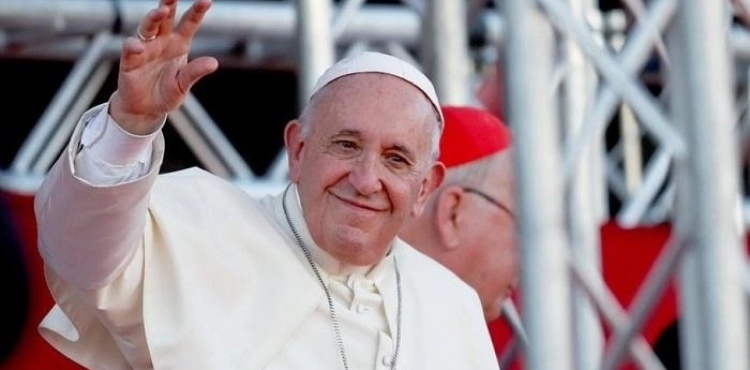Pope Francis, 86, acknowledged on Monday that it was no longer easy for him to travel due to his age, after he returned from an unprecedented visit to Mongolia that was marked by an attempt to bring about rapprochement with neighboring China, with which the Holy See does not maintain diplomatic relations.
"Dear brothers and sisters in Mongolia, thank you for the gift of friendship I have received in recent days. Bayarlala!" the Pope wrote on X shortly after his plane took off at noon. (Thanks in Mongolian).
The Pope's plane landed in Rome shortly after 16:00 (14:00 GMT).
In response to questions from journalists who were accompanying him, the Pope admitted that it was no longer “easy” for him to travel to distant countries due to his advanced age and health problems that he had been suffering from for years and had weakened him.
The Supreme Pontiff said, "Frankly, traveling is no longer as easy for me as it was before. I am no longer able to walk."
The Pope suffers from knee and hip pain, underwent intestinal surgery in June, and often moves in a wheelchair.
The Pope had two goals for this visit to Mongolia, the country located between China and Russia: to reach a remote region where Catholicism is still not widespread, and to take advantage of his presence at the gates of China to strengthen relations with Beijing.
Before leaving Mongolia on Monday morning, he went to the “House of Mercy,” which receives the homeless and victims of domestic violence, in a poor neighborhood on the outskirts of the capital, Ulaanbaatar.
Chinese Catholics came to Mongolia, braving the possible interrogations they might face upon their return.
Outside a Catholic monastery, a group of women chanted in Chinese and shed tears as the Pope's black car passed.
The women chanted, "Our best wishes to you, dear Pope!"
On the plane back, the Pope considered relations between the Vatican and Beijing to be “respectful,” considering that the two sides must “go further” to understand each other better.
The Argentine Pope said, "Relations with China are very respectful. I have great admiration for the Chinese people." He added, "We must go further in the religious aspect to understand each other better, so that Chinese citizens do not believe that the Church does not accept their culture and values, and that the Church is affiliated with a foreign power."
The Chinese government does not trust any organization, especially a religious one, that might challenge its authority.
On Sunday, the Pope appeared to be sending a message to China without naming it, saying, “Governments and secular institutions should not fear the missionary work of the Church because it has no political agenda.”
Chinese pilgrims told AFP that they informed the Chinese authorities that they were on a tourist trip so that they could come to Mongolia.
A Chinese woman who came from the northern city of Xi'an and did not reveal her name said among the crowds who participated in Sunday's mass, "It was very difficult to come here."
It confirmed that two organizers of the trip to Mongolia were arrested in China.
She added, "Let me tell you that I am ashamed of raising the (Chinese) national flag." She continued, "But I have to carry it so that the Pope knows how difficult it is for us."
Freedom of religion in Mongolia contrasts with the situation in neighboring China, where it remains restricted.
This did not prevent the Chinese government and the Vatican from renewing last year’s agreement regarding the thorny issue of appointing bishops, which some criticized as a dangerous concession from the Holy See in exchange for his presence in the country.
Mongolia, which was in the orbit of the former Soviet Union, has become a democracy since 1992. Its population is mostly Buddhist, and it includes one of the smallest Catholic groups in the world: 1,400 people, including 25 priests, out of a population of about three million.
Mongolia depends on Russia for its energy imports and on China for exporting its raw materials, especially coal.
Despite remaining neutral towards its powerful neighbours, Mongolia has pursued a “third neighbour” policy and strengthened its relations with other countries, most notably the United States, Japan and South Korea, to create balance.












